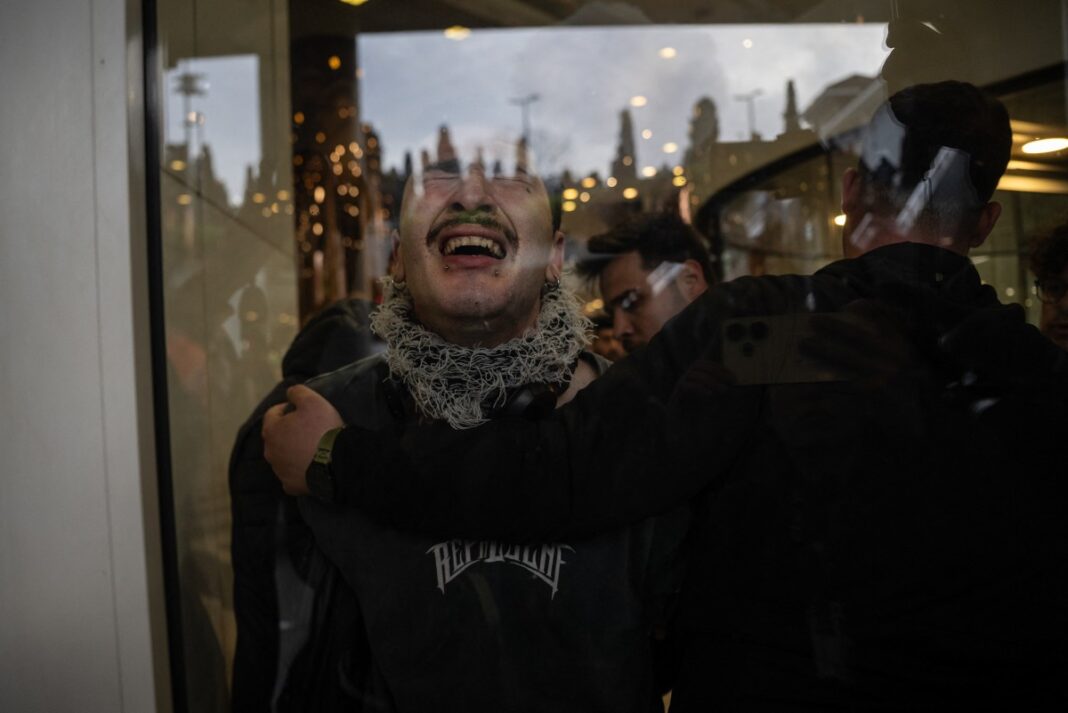After rising up to rally against the arrest of İstanbul’s powerful opposition mayor Ekrem İmamoğlu, young Turkish protesters have been forced to wake up to the reality of police custody.
Lawyers and politicians supportive of İmamoğlu, President Recep Tayyip Erdoğan’s top political challenger, have slammed the “police brutality” suffered by students detained for taking part in the country’s worst unrest for more than a decade.
“They are being put into the same cells as dangerous criminals such as murder and sexual assault convicts,” said Ferhat Güzel, a lawyer who has rushed to the defense of several students whose names he withheld for their safety.
As a result of their dangerous cellmates his clients were “scared to sleep, go to the restroom or eat,” Güzel said.
In İstanbul alone police detained 511 students for taking part in the demonstrations, of which 275 were arrested, the lawyer added.
But the real number was likely higher, he said.
“To begin with, many of these detentions and pretrial arrests are unfounded,” Güzel said.
Many of the students were detained at night or while leaving the area where the protests were taking place “with no supporting evidence regarding the charges,” Güzel said, adding that police often denied detained protesters communication with their families or lawyers.
And while in pretrial detention, “we know that many students were subjected to police brutality, in the form of physical and verbal abuse,” he added.
‘Handcuffed for hours’
Özgür Özel, head of İmamoğlu’s opposition Republican People’s Party (CHP), likewise denounced the police’s treatment of young protesters since the unrest erupted on March 19.
“These students were mistreated, handcuffed behind their backs, then left in corridors for hours without being told which prison they would be sent to,” said Özel.
While visiting İmamoğlu in the western İstanbul prison of Silivri on Sunday, the CHP head took the opportunity to meet young people held at the same facility.
Besides insults and “psychological torture,” the politician slammed “kicks in the face” suffered by the prisoners, adding that some guards applied pressure to the heads of detainees lying on the ground.
Also in the dock in Silivri was Sinan Can, a 22-year-old detained during the İstanbul protests and subsequently arrested, whose father Sinan Karahan got to visit on Friday.
“He told me there were many wounded students in the prison,” his father told Agence France-Presse.
A 19-year-old economics student at the İstanbul Technical University who had several friends jailed told AFP they were denied water and the right to go to the toilet while in custody.
Women were also prevented from having access to hygienic products, she said.
Aged around 20, the majority of these young protesters are attending rallies for the first time in their lives — and have found themselves in the dock as a result, while their terrified parents look on.
“Most of them have never even spent a night outside the family home,” a lawyer wrote last week on the X social media network.
‘Going to beat them’
“Some of the students I have represented also cried after hearing about the pretrial arrests, begging to not to be handed to the police since they were going to beat them,” lawyer Güzel said.
Turkey’s professional healthcare associations have likewise offered accounts of “ill-treatment during arrests, detentions, police custody and judicial proceedings.”
These took place “in particular in the major cities,” they said in a statement.
Güzel said the worst conditions — where protesters were shoved in with convicted rapists and murderers — were found in pretrial detention.
Most of the students have had their pre-trial hearing dates fixed for around mid-April.
CHP leader Özel said they “should not be kept in detention for another eighteen or twenty days until their first hearing,” urging their release as “none of them have blood on their hands.”
The opposition leader added those affected should “preserve the evidence to demand accountability when the time comes.”
Police have taken at least 2,000 people into custody since İmamoğlu’s detention, of whom 263 had been imprisoned, Turkey’s interior ministry said on Thursday.
It has not updated its figures since.
© Agence France-Presse



